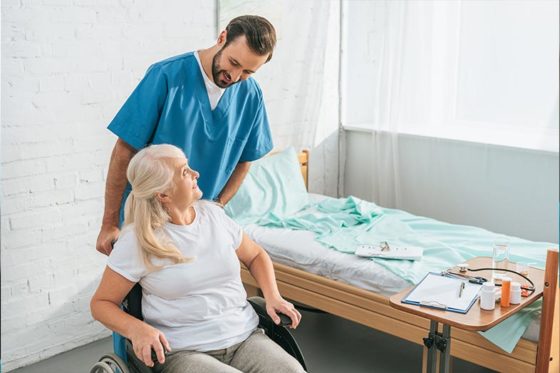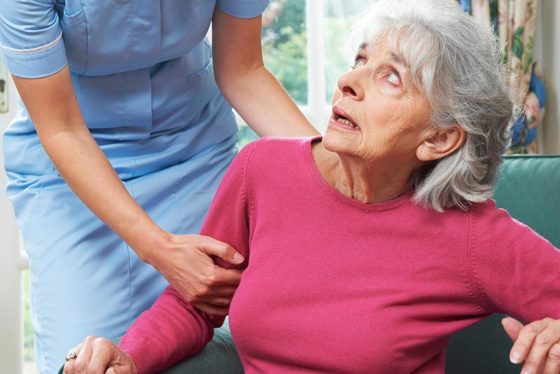Nursing Home Abuse & Neglect Lawyers in Chicago, IL
Willens & Baez is a top-rated law firm with an award-winning team of Chicago Personal Injury Lawyers and Elder Nursing Home Abuse Attorneys who can help you when you or a loved one has been injured in a nursing home abuse case. Since we charge no legal fees, unless and until we succeed in obtaining a monetary recovery for you, you can count on us fighting hard to get you the compensation you need and deserve.
We know that an injury case has the potential to take over a person’s life, making it difficult to move forward. People turn to us for the dedicated, caring help they require, regardless of the type of accident they were in or the type of injury sustained. We want to help them take control of their situation so they can focus on what matters most — getting back on track. This is also why many of our firm’s cases are referred to us from other lawyers and law firms who trust us to handle their friends, family members and clients’ personal injury cases.
Why Let Willens & Baez handle your Chicago Nursing Home Abuse or Neglect?
Long-term care facilities are usually well-resourced and prepared to defend themselves against abuse allegations. If you wish to pursue an effective case against the nursing home that harmed your loved one, get the help of Willens & Baez. We have successfully helped Chicagoan families win in nursing home cases, including:
- A $725,000 settlement for a man who developed an infection from improper treatment
- A $275,000 settlement for a woman who was dropped at the facility
- A $225,000 settlement for a resident who tripped while lacking supervision
We at Willens & Baez have an aggressive approach when facing powerful companies and organizations, but we always make it a point to be considerate when dealing with our clients. Don’t worry about the stress associated with lawyers and legal cases – our entire team is ready to serve with compassion and professionalism.
Your initial consultation with Willens & Baez is absolutely free and confidential. Please don’t hesitate to talk to us about your senior loved one’s nursing home conditions. Call Willens & Baez at (312) 957-4166 today.
Call (312) 957-4166 For a Free Consultation
Need an Experienced Chicago Nursing Home Negligence Attorney
Could your senior loved one have suffered from abuse or neglect in an elder care facility? It’s best not to ignore the signs.
The National Council on Aging reports that about 5 million US elders are abused each year, but only 1 in 14 elder abuse cases are reported to authorities. some symptoms of nursing home mistreatment don’t seem very alarming, but they could actually indicate serious forms of abuse or neglect. According to the Government Accountability Office that oversees nursing home complaints, from 2005 to 2014 the number of nursing home complaints has increased. This indicates that the quality of care from nursing homes has been declining. However, one may find it surprising that more commonly the person who commits the abuse is often a trusted family or friend rather than a stranger. In fact, according to the National Center on Elder Abuse, approximately 10% of the elderly community is victim to some sort of elder abuse. Additionally, the most likely type of abuse is verbal abuse.
If you suspect that your senior family member has been harmed in a nursing home or assisted living facility in the Chicago area, talk to us at Willens & Baez. We aim to protect seniors through our assertive legal approach while helping the entire family with our compassionate service.
The Reality Of Nursing Homes In Illinois
When we entrust an elder family member to a long-term care facility, we do so with the expectation that our loved one will get appropriate care and attention. Sadly, the reality is very often the opposite.
A 2019 survey revealed that Illinois is among the worst states when it comes to nursing home care. The Illinois Department of Public Health also says that every year, its Nursing Home Hotline receives nearly 19,000 calls, and their staff responds to over 5,000 complaints. According to the NCEA, one in ten elderly adults suffers abuse. While it is often difficult to have a loved one placed in a long-term facility, it is often safer than having them live at home without around-the-clock care.
Our state’s elder care facilities function poorly for many reasons. For-profit residences face rigid business competition, leading some to shortcut service. Residences may disregard industry guidelines, spend little on equipment, hire untrained staff, and reduce staff. A 2018 study found 280 Illinois facilities have low staffing.
These substandard practices cascade into issues such as low staff-to-resident ratios, overwork employees, and hire employees unqualified to begin with. Ultimately, it’s the residents – our elder loved ones – who suffer from unacceptable nursing home practices.
To protect your loved one from abuse, take preventative steps when choosing a facility. Compare facilities here. On this site, you can review the overall ratings of the facility as well as see the numbers for health inspections and staffing. When visiting facilities, ask how many falls have occurred and what preventative measures are taken if the facility is equipped to handle any special requirements your loved one has, and what the resident to faculty ratio is. There are several checklists available on the internet you can use to ensure you ask the right questions to find the best facility for your loved one. Do your research before selecting a facility so you can help your loved one have the best and safest experience.
Additionally, check the Illinois Department of Public Health to see if the facility has had any violations. The Nursing Home Care Act set levels for violations and sanctions given to facilities. The levels are split into the following four categories:
- Type AA violation – when a condition of the facility or something that happened caused the death of a resident. This is the most severe violation.
- Type A violation – when a condition of the facility or something that happened would certainly be likely to cause the death or serious mental or physical harm to residents. It also occurs when severe physical or mental harm has already occurred.
- Type B violation – when a condition of the facility or an occurrence is more likely than not to cause more than minimal physical or mental harm to a resident.
- Type C violation – when a condition of the facility or occurrence creates a substantial probability that less than minimal physical or mental harm to a resident will result.
If a facility has had a violation, be cautious going forward with choosing them for your loved one. Ensure you ask questions about what happened and what steps the facility has taken to ensure the problem does not occur again.
Types And Warning Signs Of Nursing Home Abuse
When we talk about elder abuse, we often think of symptoms such as bruises and serious injuries. However, there are many other abuse symptoms to look out for. Elder abuse is generally anytime a person knowingly, intentionally, or negligently causes harm to an elderly person. They can be as subtle as a slight change in the elder’s behavior, or as common as bedsore or a rash. Moreover, senior abuse is not always physical. Take note of these various forms of elder abuse, and their common warning signs.
What To Do If Your Loved One Shows Signs Of Abuse
Illinois authorities accept calls on suspected abuse or neglect. Don’t hesitate to report to the appropriate hotline:
When you spot symptoms of mistreatment on your loved one, it’s important to stay calm and rational. However, take action right away. Start by talking to the elder first, helping them feel safe enough to tell you about their condition at the nursing home. You may also want to speak politely with the staff about the signs you’ve seen. Don’t be afraid to ask many questions and take down notes.
Documentation is important when you believe abuse has occurred. To report suspected abuse, you should collect the following information:
- Name and age of the person being abused
- Signs or symptoms of the abuse
- The facility name and address
- What sort of abuse occurred
- When the abuse occurred
- Who was involved
- Who witnessed the abuse
Gather notes from your conversations, as well as other potential evidence. This can include photographs of the elder’s condition, their medical records, weight logs, bank records, receipts, and the like. When reporting suspected abuse, remain as calm as possible and stick to reporting facts.
It is best to also talk to a lawyer. Even if taking legal action is not your priority, it is worth it to at least consult with a competent and compassionate attorney who can advise you on the best options for your loved one and family. We offer free consultations and it does not cost you anything to hire us unless you get compensation.
Remember that the law intends to protect our seniors from harm. If your senior loved one has suffered in a facility, your family may have strong grounds to pursue a legal case. The compensation that you may obtain from this case can greatly relieve the financial weight that may have resulted from the abuse. Hiring an attorney will allow you to hand over the reins of dealing with legal matters and will allow you to grieve properly. More importantly, holding the nursing home accountable can be a solid step towards ensuring better care for elders like your loved one.
Willens & Baez Fights For Elders

- Aperion Care
- Arbour Health Care Center
- Balmoral Home
- Bethesda Rehab & Senior Care
- Center Home Hispanic Elderly
- Central Nursing Home
- Chalet Living & Rehab
- Citadel of Waterford
- Mayfield Care Center
- Mercy Circle Retirement Community
- Norwood Crossing
- Peterson Park Health Care Center
- Princeton Rehab & HCC
- Ridgeview Rehab & Nursing Center
- St. Paul’s House
- Sunrise of Lincoln Park
- Symphony
- The Point at Kilpatrick
- Warren Barr Gold Coast
- Windmill Nursing Pavilion












